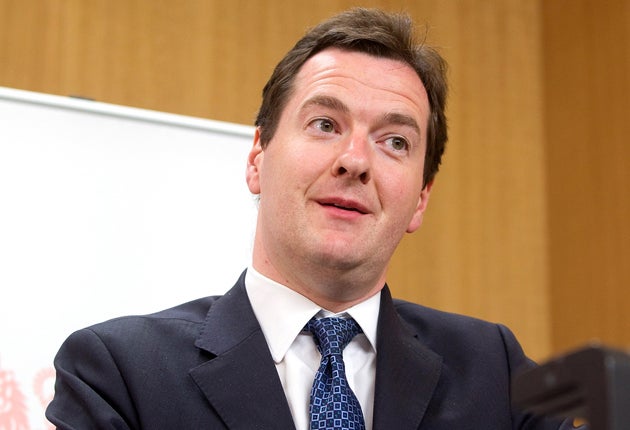
David Cameron and George Osborne are discussing plans to cut the 50p rate of income tax after being told that it is generating only marginal returns for the Exchequer.
Government sources said that both men are intent on cutting the top rate of tax, for those earning more than £150,000 a year, to 45 per cent – possibly as soon as in the Budget next April. Senior Liberal Democrats say they would not necessarily oppose the cut – provided any income tax cuts for the richest are offset by other measures that target them.
The Conservative plan – which will prove controversial at a time of severe cuts to public-sector jobs and services – is being driven by Treasury analysis suggesting that the extra revenue generated between the 45p and 50p tax bands could be as little as £750m.
The Prime Minister and Chancellor believe that the 50p tax band is sending out a damaging message to "wealth generators", particularly from abroad, whose investment and spending power is vital for the economic recovery.
But the Liberal Democrats fear that reducing the top tax rate will be unpopular with the party's core voters who will see it as giving "tax breaks to fat cats". They are determined to wring out concessions from Mr Osborne in return for not opposing a move that would be popular with Conservative grassroots supporters. Senior Conservatives are privately pushing Mr Osborne to go further and reduce taxes back to 40 per cent – at the rate they were before being raised by Labour in 2009.
Treasury projections suggest that up to 70 per cent of the expected £2.4bn revenue generated from the 50p rates would still be collected at the 45p rate. This is because, at 50p, the incentive increases to retire earlier, emigrate, contribute more to a pension or invest in tax avoidance schemes. The Treasury is still waiting for the details of an assessment by HM Revenue and Customs into the amount actually raised in the first year to April 2011.
Taxpayers have until January to file their returns and a decision on what to do about the 50p rate will be finally taken when that information has come in. It could then be included in the March Budget proposals.
One senior Conservative source said: "The decision is not about whether to do it – it's about when to do it. One option is 2012, depending on the state of the economy, or 2013 at the latest. We want it to have come into effect by the time of the next election."
The source added that the move is likely to be sold as part of a tax simplification package. The Treasury believes it can claim that combining the highest rate of income tax (50p) and national insurance (currently 13p) means taxes on income are effectively 63p. So, even after the reduction, the rate will still "effectively" be 58p.
A source close to Mr Osborne, however, tried to dampen down speculation about the cut. "We have no plans and no timetable," he said. "We don't like the tax but we are not going to decide anything until we have seen the numbers."
The move is also likely to get the blessing of the new independent Office for Budget Responsibility. Robert Chote, the head of the office, has previously suggested the 50p rate will raise almost no revenue from the approximately 300,000 people affected.
Senior Liberal Democrat sources suggested any attempt to cut the tax burden of the very wealthy would be opposed by the party. "At a time when we are asking everyone to make sacrifices, this sends out totally the wrong signal," they said. "The 50p rate was never our policy and we are not wedded to it – but any cut must be offset by other measures."
Vince Cable, the Business Secretary, suggested they might compromise in return for levying a tax on assets – possibly on the most expensive properties. "If the top tax rate were removed it would need to be replaced with something else – primarily something associated with wealth or high-value property," he said. "Anyone who thinks we are going to shift our priority to reducing the tax burden for the wealthiest has got another thing coming." However, one government source said "no work was going on into a mansion tax".
Subscribe to Independent Premium to bookmark this article
Want to bookmark your favourite articles and stories to read or reference later? Start your Independent Premium subscription today.

Join our commenting forum
Join thought-provoking conversations, follow other Independent readers and see their replies